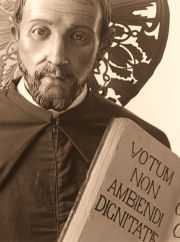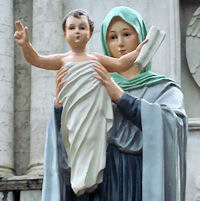13. And they send to him certain of the Pharisees and of the Herodians, to catch him in his words.
14. And when they were come, they say to him, Master, we know that you are true, and care for no man; for you regard not the person or men, but teach the way of God in truth; Is it lawful to give tribute to Caesar, or not?
15. Shall we give, or shall we not give? But he, knowing their hypocrisy, said to them, Why tempt you me? bring me a penny, that I may see it.
16. And they brought it. And he said to them, Whose is this image and superscription? And they said to him, Caesar's.
17. And Jesus answering said to them, Render to Caesar the things that are Caesar's, and to God the things that are God's. And they marveled at him.
BEDE; The Chief Priests though they sought to take Him, feared the multitude, and therefore they endeavored to effect what they could not do of themselves, by means of earthly powers, that they might themselves appear to be guiltless of His death; and therefore it is said, And they send to him certain of the Pharisees and of the Herodians, to catch him in his words.
THEOPHYL. We have said elsewhere of the Herodians, that they were a certain new heresy who said that Herod was the Christ, because the succession of the kingdom of Judah had failed. Others however say that the herodians, were the soldiers of Herod, whom the Pharisees brought as witnesses of the words of Christ, that they might take Him, and lead Him away. But observe how in their wickedness they wished to deceive Christ by flattery; for it goes on: Master, we know that you are true.
PSEUDO-JEROME For they questioned Him with honeyed words, and they surrounded Him as bees, who carry honey in the in mouth but a sting in their tail.
BEDE; But this bland and crafty question was intended to induce Him in His answer rather to fear God than Caesar, and to say that tribute should not he paid, so that the Herodians immediately on hearing it might hold Him to be an author of sedition against the Romans, and therefore they add, And care for no man: for you regard not the person of any.
THEOPHYL. So that you will not honor Caesar, that is, against the truth; therefore they add, But teach the way of God in truth. Is it lawful to give tribute to Caesar, or not? Shall we give, or shall we not give? For their whole plot was one which had a precipice on both sides, so that if He said that it was lawful to give tribute to Caesar, they might provoke the people against Him, as though He wished to reduce the nation itself to slavery; but if He said, that it was not lawful, they might accuse Him, as though He was stirring up the people against Caesar; but the Fountain of wisdom escaped their snares. Wherefore there follows: But he, knowing their hypocrisy, said to them, Why tempt you me? briny me a penny, that I may see it. And they brought it.
BEDE; A denarius was a piece of money, accounted equal to ten smaller coins, and bearing the image of Caesar; wherefore there follows: And he said to them, Whose is this image and superscription? And they said to him, Caesar's.
Let those who think that our Savior asked the question through ignorance and not by an economy, learn from this that He might have known whose image it was; but He puts the question, in order to return them a fitting answer; wherefore there follows: And Jesus answering said to them, Render to Caesar the things that are Caesar's, and to God the things that are God's.
THEOPHYL. As if He had said, Give what bears an image to him whose image it bears, that is, the penny to Caesar; for we can both pay Caesar his tribute, and offer to God what is His own.
BEDE; That is, tithes, first-fruits, oblations, and victims. In the same way as He gave tribute both for Himself and Peter, He also gave to God the things that are God's, doing the will of His Father.
PSEUDO-JEROME; Render to Caesar the money bearing his image, which is collected for him, and render yourselves willingly up to God, for the light of your countenance, O Lord, and not of Caesar's, is stamped upon us.
THEOPHYL. The inevitable wants of our bodies is as Caesar to each of us; the Lord therefore orders that there should be given to the body its own, that is, food and raiment, and to God the things that are God's. It goes on: And they marveled at him. They who ought to have believed, wondered at such great wisdom, because they had found no place for their craftiness.
Catena Aurea Mark 12

 Francis founded the Order of Minor Clerks Regular with St. John Augustine Adorno. The congregation's apostolate was preaching missions and performing diverse works of charity. In the course of time he became known as "Venerable Father, the Preacher of the Love of God," a title merited for promoting devotion to the Blessed Sacrament and introducing nocturnal adoration in his community. He had a childlike love for the Blessed Virgin; his greatest joy was to be of service to his neighbor. God endowed him with the gift of prophecy and the discernment of spirits.
Francis founded the Order of Minor Clerks Regular with St. John Augustine Adorno. The congregation's apostolate was preaching missions and performing diverse works of charity. In the course of time he became known as "Venerable Father, the Preacher of the Love of God," a title merited for promoting devotion to the Blessed Sacrament and introducing nocturnal adoration in his community. He had a childlike love for the Blessed Virgin; his greatest joy was to be of service to his neighbor. God endowed him with the gift of prophecy and the discernment of spirits.  "The perfect model of this spiritual and apostolic life is the Most Blessed Virgin Mary, the Queen of Apostles, who, while she lived on earth the life common to all, filled with labours and care of her family, was always most closely joined with her Son, and cooperated in the work of the Saviour in an entirely singular way. Moreover now, assumed into heaven 'by her motherly love she takes care of the brothers of her Son who are still on the way [to their eternal home] and who are involved in dangers and difficulties, until they are led to the blessed Fatherland.' Let all most devoutly honour her, and commend their life and apostolate to her motherly care."
"The perfect model of this spiritual and apostolic life is the Most Blessed Virgin Mary, the Queen of Apostles, who, while she lived on earth the life common to all, filled with labours and care of her family, was always most closely joined with her Son, and cooperated in the work of the Saviour in an entirely singular way. Moreover now, assumed into heaven 'by her motherly love she takes care of the brothers of her Son who are still on the way [to their eternal home] and who are involved in dangers and difficulties, until they are led to the blessed Fatherland.' Let all most devoutly honour her, and commend their life and apostolate to her motherly care." 

